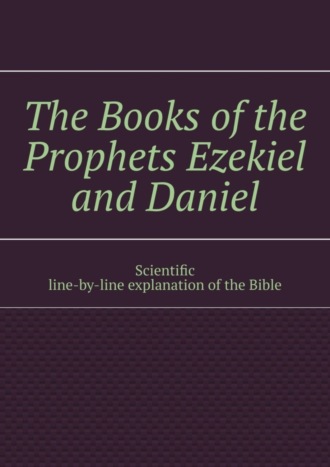
Полная версия
The Books of the Prophets Ezekiel and Daniel. Scientific line-by-line explanation of the Bible
22 And then there will remain in it a remnant, sons and daughters, who will be brought out from there; behold, they will come out to you, and you will see their conduct and their deeds, and you will be comforted for the evil that I have brought upon Jerusalem, for all that I have brought upon it. (The Jewish priests threaten the wicked through their prophet).
23 They will comfort you when you see their conduct and their deeds; and you will know that I have not done in vain all that I have done in him, says the Lord God. (The Jewish priests threaten the wicked through their prophet).
Chapter 15
1 And the word of the LORD came to me: (Hypnotist’s voice).
2 son of man! what advantage does the vine tree have over any other tree and the branches of the vine – between the trees in the forest? (Comparison with plants and trees).
3 Do they take a piece from him for any product? Do they take at least a nail from him to hang any thing on it? (Comparison with plants and trees).
4 Behold, it is given to the fire to be eaten; the fire has eaten both ends of it, and the middle of it is burnt: is it fit for any article? (Comparison with plants and trees).
5 And then, as it was whole, it was not suitable for any product; moreover, when the fire ate it, and it was burned, is it suitable for any product? (Comparison with plants and trees).
6 Therefore thus saith the LORD God: As the tree of the vine among the trees of the forest I have given to the fire to be eaten, so will I give to it the inhabitants of Jerusalem. (Comparison with plants and trees).
7 And I will turn my face against them; they will come out of one fire, and another fire will devour them, and you will know that I am the LORD when I turn my face against them. (The Jewish priests threaten the wicked through their prophet).
8 And I will make this land desolate because they have treacherously acted, says the LORD God. (The Jewish priests threaten the wicked through their prophet).
Chapter 16
1 And the word of the LORD came to me: (Hypnotist’s voice).
2 son of man! express its abominations to Jerusalem (the Jewish priests threaten the wicked through their prophet).
3 And say: Thus saith the LORD God of Jerusalem: your root and your homeland are in the land of Canaan; your father is an Amorite, and your mother is a Hittite; (The Amorites are one of the groups of nomadic Semitic tribes that invaded Mesopotamia and Canaan around 2000 BC. They conquered Sumer (Sennaar), Akkad and Assyria and founded their dynasties in the city-states of Canaan. In 1792 BC, Hammurabi ascended the throne in the small Amorite state of Babylon, who later conquered all of Sumer and Akkad. Under the rule of the dynasty of kings founded by the Amorites, a powerful empire of antiquity was created – the Assyrian power. The Hittites (or Hittites) are ancient tribes belonging to the Indo-European group of peoples; according to Biblical history, the Hittites descend from Heth, the son of Canaan (Gen. 15:20; 23:3, etc.). The Hittites appeared on the territory of modern Turkey in the 2nd millennium BC. Their unification into a single kingdom occurred ca. 1740 BC. The highest heyday of the Hittite empire occurred in the XV – XIV centuries BC. The Hittites occupied Syria and conquered Babylon (c. 1595 BC). During the period of the New Hittite Kingdom (1450—1200 BC) there were clashes with the Egyptians. After the battle of Kadesh in 1286, a peace treaty was concluded between the two empires, establishing the southern border of the Hittite empire approximately along the northern border of Palestine. Around 1200 BC, the Hittite empire collapsed under the blows of the «peoples of the sea» (see: Philistines), but the Hittite culture survived in certain areas, including in Northern Syria. The Hittites are mentioned in the time of Solomon, and later, in the time of the prophet Elisha (3 Kings 10.29; 11:1; 4 Kings 7:6).).
4 at your birth, on the day you were born, your navel was not cut off, and you were not washed with water for purification, and you were not salted with salt, and you were not wrapped in swaddling clothes. (Comparison with the birth of a child with bad parents).
5 No one’s eye took pity on you to do any of these things out of mercy for you; but you were thrown out into the field, out of contempt for your life, on the day of your birth. (Comparison with the birth of a child with bad parents).
6 And I was passing by you, and I saw you being trampled on in your blood, and I said to you, «Live in your blood!» So I said to you, «live in your blood!» (Comparison with the birth of a child with bad parents).
7 He multiplied you like the plants of the field; you grew up and became large, and achieved excellent beauty: your breasts were lifted up, and your hair grew; but you were naked and uncovered. (Comparison with field plants).
8 And I passed by you, and saw you, and, behold, it was your time, the time of love; and I stretched out the resurrection And he swore to you and made a covenant with you, says the LORD God, and you became mine. (Comparison with the birth of a child with good parents).
9 I have washed you with water, and washed your blood from you, and anointed you with oil. (Comparison with the birth of a child with good parents).
10 And he put a patterned dress on you, and shod you in morocco sandals, and girded you with linen, and covered you with a silk veil. (Comparison with the birth of a child with good parents).
11 And he dressed you in finery, and put your wrists on your hands and a necklace on your neck. (Wrists or bracelets are jewelry in the form of rings or ribbons worn on the hand by both women and men).
12 And he gave you a ring on your nose, and earrings for your ears, and a beautiful crown on your head. (Comparison with the birth of a child with good parents).
13 So you were adorned with gold and silver, and your clothes were fine linen and silk and patterned fabrics; you ate bread made of the best wheat flour, honey and oil, and you were extremely beautiful, and achieved royal greatness. (Comparison with the birth of a child with good parents).
14 And your glory spread among the nations for the sake of your beauty, because it was completely perfect with the magnificent outfit that I put on you, says the Lord God. (Comparison with the birth of a child with good parents).
15 But you trusted in your beauty, and taking advantage of your glory, you began to fornicate and lavished your fornication on everyone passing by, giving yourself to him. (Comparison with a wayward daughter-daughter).
16 And she took out of your garments, and made for herself many-colored heights, and committed fornication on them, as it will never happen and will never happen. (Comparison with a wayward daughter-daughter).
17 And she took your fine things of my gold and of my silver, which I had given you, and made for herself male images, and fornicated with them. (Comparison with a wayward daughter-daughter).
18 And she took your patterned dresses, and clothed them with them, and set my oil and my incense before them, (A comparison with a wayward daughter-daughter).
19 And my bread, which I gave you, wheat flour, and oil, and honey, with which I fed you, you set before them in a pleasant fragrance; and it was, says the LORD God. (Comparison with a wayward daughter-daughter).
20 And she took your sons and your daughters, whom you bore to me, and sacrificed them for food. Was it not enough for you to commit fornication? (Comparison with a wayward daughter-daughter).
21 But you also killed my sons and gave them to them, leading them through [fire]. (Comparison with a wayward daughter-daughter).
22 And with all your abominations and your fornications, you have not remembered the days of your youth, when you were naked and uncovered, and cast in your blood to be trampled on. (Comparison with a wayward daughter-daughter).
23 And after all your evil deeds, woe, woe to you! says the Lord God, – (The promise of all kinds of troubles and misfortunes).
24 you have built fornications for yourself and made yourself high places in every square; (Comparison with a wayward daughter-daughter).
25 at the beginning of every road, she made herself exalted, disgraced your beauty, and spread out your feet for everyone passing by, and multiplied your fornications. (Comparison with a wayward daughter-daughter).
26 You have fornicated with the sons of Egypt, your neighbors, men of great stature, and you have multiplied your fornications, angering me. (Comparison with a wayward daughter-daughter).
27 And, behold, I have stretched out my hand against you, and have reduced what was appointed for you, and have given you to the mercy of the daughters of the Philistines who hate you, who are ashamed of your shameful behavior. (God allegedly punished the wayward daughter by giving her to various foreign peoples).
28 And you fornicated with the sons of Assyria and were not satisfied; you fornicated with them, but you were not satisfied; (God allegedly punished the wayward daughter by giving her to various foreign peoples).
29 And she multiplied your fornications in the land of Canaan to Chaldea, but she was not satisfied with that either. (God allegedly punished the wayward daughter by giving her to various foreign peoples).
30 How weary your heart must be, says the LORD God, when you did all these things like an unbridled harlot! (God allegedly punished the wayward daughter by giving her to various foreign peoples).
31 When you built fornications for yourself at the beginning of every road and made elevations for yourself in every square, you were not like a harlot, because you rejected gifts (Elevations, a wire through fire was considered a sin by the Jews, as it reminded of the most ancient pagan customs that were previously among the Jews).
32 but like an adulterous wife who accepts strangers instead of her husband. (Comparison with a harlot).
33 They give gifts to all harlots, but you yourself gave gifts to all your lovers and bribed them so that they would come to you from all sides to fornicate with you. (Comparison with a harlot).
34 Your fornications were contrary to what happens to women: they did not chase you, but you gave gifts, and they did not give you gifts; therefore, you acted contrary to others. (Comparison with a harlot).
35 Therefore, harlot, hear the word of the LORD! (Suggestion with words).
36 Thus saith the LORD God: because you poured out your money in this way, and in your fornications your nakedness was revealed before your lovers and before all your vile idols, and for the blood of your sons whom you gave to them – (Comparison with a harlot).
37 Therefore, behold, I will gather all your lovers, whom you have enjoyed and whom you have loved, with all those whom you have hated, and I will gather them from everywhere against you, and I will uncover your nakedness before them, and they will see all your shame. (Punishment of the harlot).
38 I will judge you by the judgment of adulterers and those who shed blood, and I will betray you to bloody rage and jealousy; (The punishment of the harlot).
39 I will deliver you into their hands, and they will destroy your fornications, and scatter your high places, and tear off your clothes, and take your garments, and leave you naked and uncovered. (Punishment of the harlot).
40 And they will call an assembly upon you, and stone you, and cut you with their swords. (Punishment of the harlot).
41 They will burn your houses with fire and execute judgment on you before the eyes of many wives; and I will put an end to your fornication, and you will no longer give gifts. (Punishment of the harlot).
42 And I will quench my anger against you, and my indignation will depart from you, and I will be at peace, and I will no longer be angry. (Punishment of the harlot).
43 Because you did not remember the days of your youth and irritated me with all these things, behold, I will turn your behavior on your head, says the LORD God, so that you will no longer indulge in debauchery after all your abominations. (Punishment of the harlot).
44 Behold, anyone who speaks in parables can say of you, «Like the mother, so is the daughter.» (The use of parables-fables).
45 You are a daughter like your mother, who abandoned her husband and her children, and you are a sister like your sisters, who abandoned their husbands and their children. Your mother is a Hittite, and your father is an Amorite. (Comparison with a harlot).
46 But your big sister is Samaria, who lives on your left with her daughters; and your little sister, who lives on your right, is Sodom with her daughters. (Sodom and Gomorrah: In many places of the Bible, the names of these cities are mentioned as a terrible lesson to all who lead an ungodly life).
47 But you did not walk in their ways, nor did you walk in their abominations; that was not enough: you have acted more depraved than them in all your ways. (Comparison with a harlot).
48 As I live, saith the LORD God, Sodom, thy sister, hath not done that which thou and thy daughters have done. (Sodom and Gomorrah: In many places of the Bible, the names of these cities are mentioned as a terrible lesson to all who lead an ungodly life).
49 This was the iniquity of your sister Sodom and her daughters: in pride, satiety, and idleness, and she did not support the hands of the poor and the needy. (Sodom and Gomorrah: In many places of the Bible, the names of these cities are mentioned as a terrible lesson to all who lead an ungodly life).
50 And they were proud, and did abominations before me, and when I saw it, I rejected them. (Ezekiel, like the ancient prophets, examines in detail the past of his people and shows all their ingratitude and grave sins before God. Jerusalem was worse than Sodom).
51 And Samaria has not sinned half of your sins; you have surpassed them with your abominations, and through your abominations, which you have done, your sisters have been more right than you. (Following the example of Hosea, Ezekiel personifies Samaria and Jerusalem in the form of two harlots, constantly cheating on their lawful spouse, Yahweh, with lovers Assyrian, Egyptian, Babylonian).
52 Bear your shame, and you, who have condemned your sisters; according to your sins, by which you have disgraced yourself more than them, they are more right than you. Blush with shame and you, and bear your shame, thus justifying your sisters. (Ezekiel personifies Samaria and Jerusalem in the form of two harlots, constantly cheating on their lawful spouse, Yahweh, with lovers Assyrian, Egyptian, Babylonian).
53 But I will bring back their captivity, the captivity of Sodom and her daughters, the captivity of Samaria and her daughters, and between them the captivity of your captives (Sodom and Gomorrah: in many places of the Bible, the names of these cities are mentioned as a terrible lesson to all who lead an ungodly life).
54 That you may bear your shame and be ashamed of all that you have done, serving as a consolation for them. (Samaria, that is, the kingdom of Israel, justly suffered for its crimes before God, and Jerusalem – Judah – turned out to be twice as sinful).
55 And your sisters, Sodom and her daughters, will return to their former state; and Samaria and her daughters will return to their former state, and you and your daughters will return to your former state. (Sodom and Gomorrah: In many places of the Bible, the names of these cities are mentioned as a terrible lesson to all who lead an ungodly life).
56 There was no mention of your sister Sodom in your mouth in the days of your pride (Sodom and Gomorrah: in many places of the Bible, the names of these cities are mentioned as a terrible lesson to all who lead an ungodly life).
57 Until your wickedness was revealed, as at the time of the disgrace from the daughters of Syria and all those around her, from the daughters of the Philistines, who looked at you with contempt from all sides. (Comparison with a harlot).
58 Because of your debauchery and because of your abominations, you suffer, says the LORD. (Comparison with a harlot).
59 For thus saith the LORD God, I will do unto thee as thou hast done, despising the oath of breaking the covenant. (The promise of all sorts of troubles).
60 But I will remember my union with you in the days of your youth, and I will restore an everlasting union with you. (But, having shamed the traitor, Yahweh, that is, manipulative priests, just like Hosea, promises her forgiveness).
61 And you will remember your ways, and you will be ashamed when you receive your sisters, your big ones, as well as your little ones, and when I give them to you as daughters, but not from your union. (Priests need constant offerings and sacrifices, and this is possible only from people who are besotted with religious nonsense).
62 I will restore my union with you, and you will know that I am the Lord (the Lord is the master slaveholder, hypnotist and schemer).
63 in order for you to remember and be ashamed, and so that you cannot open your mouth in shame when I forgive you everything you have done, says the Lord God. (Priests need constant offerings and sacrifices, and this is possible only from people who are besotted with religious nonsense).
Chapter 17
1 And the word of the LORD came to me: (Hypnotist’s voice).
2 son of man! Offer a riddle and tell a parable to the house of Israel. (Secret priests will not calm down in any way, coming up with all sorts of options for seducing the «chosen ones»).
3 Say: Thus saith the LORD God: a great eagle with great wings, with long feathers, fluffy, mottled, flew to Lebanon and took off the top of the cedar, (A parable-riddle).
4 He plucked the topmost of its young shoots and brought it to the land of Canaan, and laid it in the city of merchants; (A parable-riddle).
5 and he took of the seed of the land, and planted the seed on the land, and placed it by the great waters, as they plant a willow tree. (A parable-riddle).
6 And it grew, and became a vine, wide, low in stature, whose branches bent towards it, and its roots were under it, and became a vine, and gave branches, and put forth branches. (A parable-riddle).
7 And there was also an eagle with large wings and fluffy; and, behold, this vine reached out to him with its roots and stretched out its branches to him, so that he watered it from the furrows of his seedling. (A parable-riddle).
8 She was planted in a good field, by great waters, so that she could put out branches and bear fruit, and become a magnificent vine. (A parable-riddle).
9 Say, Thus saith the LORD God, Will she succeed? Will not its roots be torn out, and will not its fruits be torn off, so that it withers? all the young branches that have grown from it will wither. And not with great force and not with many people will they pluck it from its roots. (A parable-riddle).
10 And behold, though she is planted, will there be success? Will it dry up as soon as the east wind touches it? it will dry up on the ridges where it grew up. (A parable-riddle).
11 And the word of the LORD came to me: (Suggestion by words).
12 Tell the rebellious house: Don’t you know what this means?«Say, Behold, the king of Babylon came to Jerusalem, and took his king and his princes, and brought them to him to Babylon. (The Babylonian invasion of Jerusalem, the capture of the Jewish king and his entourage).
13 And he took [another] from the royal family, and made an alliance with him, and bound him by an oath, and took the strong of that land with him, (The Babylonian king planted his puppet in Jerusalem, the nobility was taken to Babylonia-Chaldea. The 4th Book of Kings, 24:17 «And the king of Babylon reigned Matthias, the uncle of [Jehonia], instead of him, and changed his name to Zedekiah,» the new king of Judea is a protege of Babylon, the change of the king’s name meant a change of cult, ideology).
14 that the kingdom may be submissive, that it may not rise, that we may keep the union and stand firm. (The main thing for the Babylonians is that Judea should be a submissive country).
15 But he rebelled against him, sending his messengers to Egypt to give him horses and many men. Will he succeed? Will the one who does it survive? Has he broken the alliance and will he survive? (King Zedekiah of Judah contacted the king of Egypt. The 4th Book of Kings, chapter 24, «19 And he did evil in the sight of the LORD in all things as Joachim did.» The king did not support Yahweh’s priests. «20 The wrath of the LORD was upon Jerusalem and upon Judah, to the extent that he rejected them from his presence. And Zedekiah was rebelled against the king of Babylon.» The king of Judah ceased to obey Babylon).
16 I live, says the LORD God, in the abode of the king who made him king, and to whom he has despised his oath, and has broken his covenant with him, he will die with him in Babylon. (God lives in Jerusalem, on Mount Zion).
17 With great power and with a large people, Pharaoh will do nothing for him in this war, when the rampart will be built and siege towers will be built for the destruction of many souls. (The Egyptians did not support the Jews, Jerusalem was under siege).
18 He despised the oath to break the covenant, and behold, he gave his hand and did all these things; he will not survive. (Zedekiah found himself in a difficult position.)
19 Therefore thus saith the LORD God: I live! My oath, which he has despised, and My union, which he has broken, I will turn on his head. (Due to the fact that Zedekiah did not support the priests of Judaism, he lost).
20 And I will cast my net upon him, and he will be caught in my snare; and I will bring him to Babylon, and there I will sue him for his treachery against me. (4 Kings, chapter 25, «5 And the army of the Chaldeans pursued the king, and overtook him in the plains of Jericho, and all his army fled from him.» Arrest of the tsar. «6 And they took the king, and brought him to the king of Babylon at Riblah, and judged him, «The judgment of Zedekiah. «7 And the sons of Zedekiah were slaughtered before his eyes, but [himself] Zedekiah blinded his eyes and bound him with fetters, and took him to Babylon.» The «princes of the blood» were killed, the king himself was blinded and taken to Babylon in chains).
21 But all his fugitives from all his regiments will fall by the sword, and the rest will be scattered to all winds; and you will know that I, the LORD, have said this. (And all, they say, because they stopped honoring the «right» god).
22 Thus saith the LORD God: And I will take from the top of a tall cedar, and plant it; from its upper shoots I will tear off a tender branch, and plant it on a high and majestic mountain. (Analogy with the eagle and cedar from Lebanon).
23 I will plant it on the high mountain of Israel, and it will put forth branches, and bring forth fruit, and it will become a majestic cedar, and all kinds of birds will dwell under it, all kinds of birds will dwell in the shade of its branches. (Analogy with the eagle and cedar from Lebanon).
24 And all the trees of the field will know that I, the LORD, am lowering a tall tree, raising a low tree, drying up a green tree, and making a dry tree flourish: I, the LORD, have said, and I will do it. (Analogy with the eagle and cedar from Lebanon).
Chapter 18
1 And the word of the LORD came to me: (Hypnotist’s voice).
2 Why do you use this proverb in the land of Israel, saying, «The fathers ate sour grapes, but the children’s teeth are set on edge»? (Using a quote from Jeremiah: 31:29 In those days, it will no longer be said: «the fathers ate sour grapes, and the children’s teeth are set on edge»; a happy life for the people as a whole in the indefinite distant future was little consolation for an individual Jew, a contemporary of Ezekiel).
3 I Live! Says the Lord God, – they will not speak this proverb in Israel. (The Jewish priesthood does not benefit from this proverb, since it rejects «sinful» Jews, since, they say, they bear the constant «seal of sin»).
4 For behold, all souls are mine: both the soul of the father and the soul of the son are Mine: the soul that sins will die. (Everything, they say, depends on Yahweh).
5 If anyone is righteous and does justice and righteousness, (the righteous who observe all the ordinances of the priesthood).
6 He does not eat on the mountains of sacrifice, and does not turn his eyes to the idols of the house of Israel, does not defile his neighbor’s wife, and does not approach his wife during the purification of her uncleanness (the righteous who observe all the ordinances of the priesthood).









